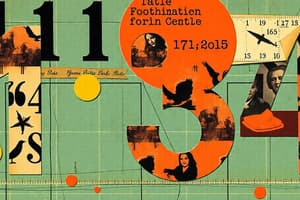Podcast
Questions and Answers
What is a whole number?
What is a whole number?
- A number that can be a fraction
- A number without fractions or decimals (correct)
- A prime number only
- A number that includes decimals
Which activity is NOT recommended for helping children master whole numbers 1-5?
Which activity is NOT recommended for helping children master whole numbers 1-5?
- Skipping number sequences randomly (correct)
- Counting objects such as toys
- Writing numerals repeatedly for practice
- Reading numbers and associating them with spoken forms
Why is it important for children to count objects one-by-one?
Why is it important for children to count objects one-by-one?
- To increase their speed in counting
- To develop their writing skills
- To memorize number symbols only
- To ensure they understand each number's place in the sequence (correct)
What is a crucial aspect of writing whole numbers correctly?
What is a crucial aspect of writing whole numbers correctly?
How does mastering whole numbers 1-5 benefit children for future learning?
How does mastering whole numbers 1-5 benefit children for future learning?
Flashcards
What are whole numbers 1-5?
What are whole numbers 1-5?
Numbers without any fractions or decimals, like 1, 2, 3, 4, and 5.
What is rote counting?
What is rote counting?
Saying the numbers in order, like 1, 2, 3, 4, 5.
How do you read whole numbers?
How do you read whole numbers?
Matching the written numeral with its spoken word, like '1' for 'one' and '2' for 'two'.
What is counting objects?
What is counting objects?
Signup and view all the flashcards
How do you write whole numbers?
How do you write whole numbers?
Signup and view all the flashcards
Study Notes
Understanding Whole Numbers 1-5
- A whole number is a number without fractions or decimals. Examples include 1, 2, 3, 4, and 5.
- Children need to correctly read, count, and write these numbers.
Reading Skills
- Reading whole numbers 1-5 involves matching spoken words to numerical symbols.
- Practice associating written numerals with spoken forms.
- Introduce vocabulary about quantities and counting.
Counting Skills
- Rote counting (saying numbers in order) is essential.
- Counting objects (toys, blocks, fingers) helps grasp quantity.
- Counting one-by-one strengthens understanding of number sequence.
- Counting forwards and backwards is critical.
Writing Skills
- Correctly writing these numbers uses the appropriate symbols.
- Frequent writing practice builds muscle memory and accuracy.
- Linking numerals to their spoken forms is vital.
- Encourage diverse writing activities (tracing, independent writing).
- Consistent practice improves writing speed and accuracy.
Importance of Understanding Whole Numbers 1-5
- Mastering these numbers forms a base for future math concepts.
- It's a foundational skill for number sense and arithmetic.
- This understanding is essential for everyday tasks like counting.
Studying That Suits You
Use AI to generate personalized quizzes and flashcards to suit your learning preferences.




